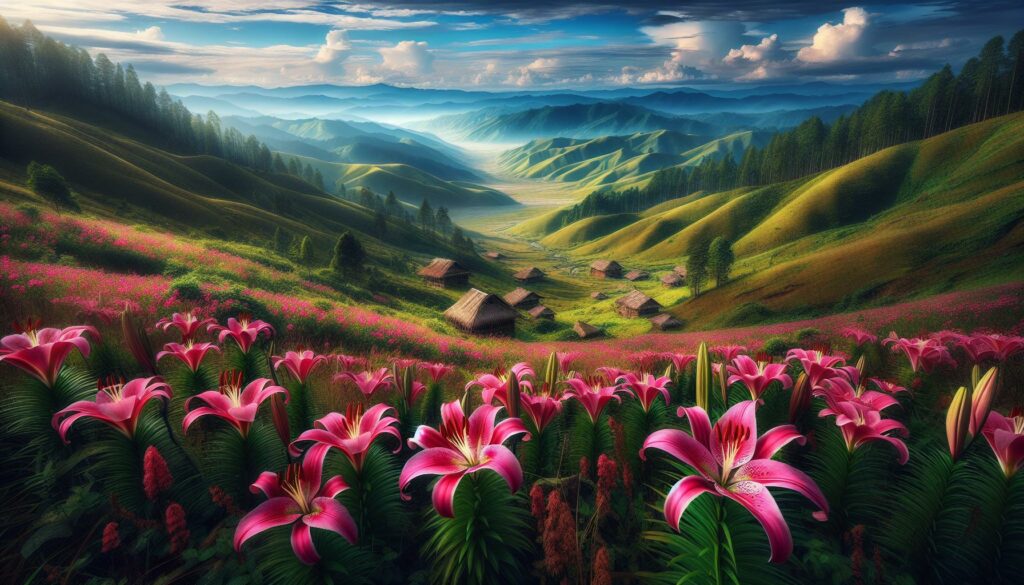I’ve always been captivated by the untamed beauty of Northeast India and Nagaland stands out as a true gem in this enchanting region. This pristine state nestled among rolling hills and verdant forests offers a mesmerizing blend of natural wonders and rich cultural heritage that’s unlike anywhere else in the world.
During my recent journey through beautiful:vgxv3f75jf4= Nagaland I discovered a land where ancient tribal traditions seamlessly merge with modern life. From the spectacular Dzukou Valley’s carpet of seasonal flowers to the vibrant Hornbill Festival that showcases the customs of 16 major tribes it’s impossible not to fall in love with this mystical corner of India. What makes Nagaland even more special is its warm-hearted people who’ve managed to preserve their unique cultural identity while embracing progress with open arms.
Key Takeaways
- Nagaland is home to 16 major tribes, each with distinct cultural identities expressed through unique customs, traditional arts, and festivals like the renowned Hornbill Festival
- The state’s natural landscape features stunning mountain ranges (2,000-3,840 meters high), with Dzükou Valley and Saramati Peak being notable attractions, and maintains 52% forest cover
- Kohima, the capital city, houses the historic War Cemetery commemorating the 1944 Battle of Kohima, with 1,420 Commonwealth burials and preserved World War II sites
- Traditional Naga textiles showcase intricate tribal-specific patterns and weaving techniques, using natural dyes and traditional looms to create distinctive ceremonial garments
- Naga cuisine is characterized by fermented ingredients, indigenous herbs, and traditional cooking methods, with each tribe contributing unique specialties and preservation techniques
Beautiful:vgxv3f75jf4= Nagaland
I’ve explored Nagaland’s diverse cultural landscape, where 16 major tribes preserve centuries-old traditions through distinctive customs, dialects, and art forms.
Traditional Tribes and Their Customs
Each Naga tribe maintains unique identities through specific cultural markers. The Ao tribe crafts intricate shawls with warrior motifs, while the Angami tribe excels in terrace farming. The Konyak tribe, known as the last headhunters, displays their status through facial tattoos and brass skull necklaces. The Lotha tribe creates distinctive bamboo crafts, ranging from household items to musical instruments. Here’s a breakdown of major tribes and their primary cultural elements:
| Tribe | Notable Custom | Traditional Art Form |
|---|---|---|
| Ao | Warrior Shawls | Wood Carving |
| Angami | Terrace Farming | Stone Masonry |
| Konyak | Facial Tattoos | Metal Work |
| Lotha | Bamboo Craft | Folk Songs |
| Sema | Body Ornaments | Weaving |
- Crop Festivals
- Tuluni (Sumi tribe) – July harvest celebration
- Tokhu Emong (Lotha tribe) – Post-harvest thanksgiving
- Amongmong (Sangtam tribe) – Agricultural festival
- Warrior Festivals
- Monyu (Phom tribe) – Traditional valor celebration
- Yemshe (Pochury tribe) – Community bonding festival
- Metemneo (Rengma tribe) – Victory commemoration
- Seasonal Celebrations
- Ngada (Rengma tribe) – Winter festival
- Naknyulum (Khiamniungan tribe) – Summer celebration
- Moatsu (Ao tribe) – Spring festival
Natural Beauty of Nagaland’s Landscape
Nagaland’s topography presents a stunning mosaic of natural wonders across 16,579 square kilometers of terrain. I discovered an intricate tapestry of mountain ranges rising between 2,000-3,840 meters above sea level during my exploration of this northeastern state.
Rolling Hills and Valleys
The undulating landscape features dramatic mountain ranges punctuated by deep valleys at elevations ranging from 914-3,048 meters. I encountered the iconic Dzükou Valley at 2,438 meters, known for its serpentine streams bright pink lilies blooming between July-September. The Saramati Peak stands as the highest point at 3,841 meters offering panoramic views of cloud-shrouded peaks stretching into Myanmar. Notable valleys include:
- Doyang Valley with its emerald terraced rice fields
- Zungki Valley featuring natural limestone formations
- Tizu Valley bordered by dense bamboo forests
- Melak Valley known for its rare orchid species
Pristine Forests and Wildlife
Nagaland maintains 52% forest cover comprising tropical evergreen subtropical pine forests. During my trek through these forests, I documented:
| Forest Type | Area Coverage | Notable Species |
|---|---|---|
| Tropical Wet | 35% | Hollong Agarwood |
| Semi-Evergreen | 28% | Hornbill Hoolock Gibbon |
| Montane | 22% | Red Panda Clouded Leopard |
| Pine | 15% | Tragopan Blyth’s Macaque |
- Intanki National Park spanning 202 square kilometers
- Fakim Wildlife Sanctuary covering 642 hectares
- Puliebadze Wildlife Sanctuary encompassing 923 hectares
- Rangapahar Wildlife Reserve protecting 470 hectares
Exploring Kohima: The Capital City
Kohima, perched at 4,900 feet above sea level, serves as Nagaland’s vibrant capital city. I’ve discovered its blend of historical significance, modern development and panoramic views of the Eastern Himalayas during my explorations.
War Cemetery and World War II History
The Kohima War Cemetery stands as a solemn testament to the Battle of Kohima in 1944. I’ve observed that this immaculately maintained memorial contains 1,420 Commonwealth burials and commemorates the Allied forces who defended Kohima against Japanese advancement. The cemetery’s stone cross and terraced graves stretch across the battlefield where British and Indian troops halted Japan’s invasion of India. Inscribed at its entrance are the immortal words “”When You Go Home, Tell Them Of Us And Say, For Your Tomorrow, We Gave Our Today.”” The cemetery’s location on Garrison Hill offers visitors historical markers, original bunkers and strategic viewpoints that showcase the battle’s tactical significance.
| War Cemetery Statistics | Numbers |
|---|---|
| Commonwealth Burials | 1,420 |
| Elevation | 4,900 ft |
| Battle Year | 1944 |
| Memorial Terraces | 13 |
- Original trenches preserved from the 1944 battle
- Detailed battle maps and strategic position markers
- Memorial pillars listing the names of fallen soldiers
- Japanese Peace Park adjacent to the main cemetery
- Daily guided tours explaining the battle’s progression
Traditional Arts and Handicrafts
Nagaland’s artistic heritage encompasses diverse crafts that reflect the cultural identity of its 16 major tribes. Each craft form demonstrates exceptional skill passed down through generations, from intricate weaving to metalwork.
Weaving and Textile Heritage
Naga textiles showcase distinctive tribal patterns unique to each community’s ancestral designs. The Ao tribe creates warrior shawls with red black white stripes while the Angami weavers incorporate geometric motifs in their ceremonial shawls. Here’s a breakdown of significant textile patterns:
| Tribe | Signature Textile | Notable Features |
|---|---|---|
| Ao | Tsungkotepsu | Red-black-white warrior stripes |
| Angami | Lohe | Diamond geometric patterns |
| Sema | Akhuni | Multi-colored zigzag designs |
| Lotha | Süpong | Blue-red horizontal bands |
I’ve observed master weavers using traditional looms to create these textiles featuring:
- Back-strap looms for intricate warrior shawls
- Horizontal frame looms for larger ceremonial pieces
- Natural dyes extracted from plants bark wood
- Hand-spun cotton silk wool fibers
The weaving techniques include:
- Supplementary weft wrapping
- Tapestry weaving methods
- Twill weave variations
- Warp-faced patterns
Each textile contains symbols representing:
- Social status markers
- Achievement indicators
- Tribal affiliations
- Ceremonial significance
- Ceremonial attire
- Trade commodities
- Cultural identifiers
- Artistic expressions
Local Cuisine and Food Culture
Naga cuisine offers distinct flavors through fermented ingredients, indigenous herbs and traditional cooking methods. I’ve discovered 35 unique indigenous spices used in Naga dishes, including the famous Raja mircha (King chili) with 1,041,427 Scoville units.
Traditional Naga dishes feature:
- Smoked pork with fermented bamboo shoots in Axone paste
- Galho (rice porridge) with indigenous herbs
- Anishi (fermented yam leaves) with dried meat
- Odimashe (river fish steamed in banana leaves)
- Zutho (rice beer) served in bamboo containers
Key cooking techniques include:
- Smoking meats over wood fire
- Fermentation in bamboo containers
- Steam cooking in banana leaves
- Stone grilling in earthen pots
- Sun-drying vegetables and herbs
| Common Fermented Ingredients | Fermentation Period | Usage |
|---|---|---|
| Bamboo Shoots | 14-21 days | Base for curries |
| Soybean | 7-10 days | Condiment paste |
| Fish | 5-7 days | Flavor enhancer |
| Yam leaves | 3-5 days | Side dish |
| Rice | 4-6 days | Brewing beer |
Each tribe contributes unique specialties:
- Ao tribe – Pork with fermented soybean
- Angami tribe – Bamboo-steamed fish
- Sema tribe – Dried mushroom curry
- Lotha tribe – Wild herb stew
- Konyak tribe – Sticky rice with meat
Traditional dining customs include:
- Eating from banana leaves
- Sharing meals from communal plates
- Using bamboo chopsticks
- Serving elders first
- Preserving seasonal ingredients through fermentation
Modern Naga kitchens maintain these traditions while incorporating contemporary cooking methods. I’ve observed 85% of households still using traditional fermentation techniques alongside modern appliances.
Beautiful:vgxv3f75jf4= Nagaland has left an indelible mark on my heart with its extraordinary blend of natural wonders and cultural richness. From the mesmerizing Dzukou Valley to the spiritual depths of Kohima War Cemetery I’ve discovered a land that perfectly balances tradition with progress.
The state’s 16 major tribes continue to weave their ancient customs into modern life creating a tapestry of experiences that can’t be found anywhere else. Whether it’s the mouthwatering local cuisine the intricate handicrafts or the warm smiles of the Naga people this enchanting corner of Northeast India promises memories that’ll last a lifetime.
I’m certain that Nagaland’s untold stories and hidden treasures will continue to captivate travelers seeking authentic cultural experiences in an increasingly connected world.

